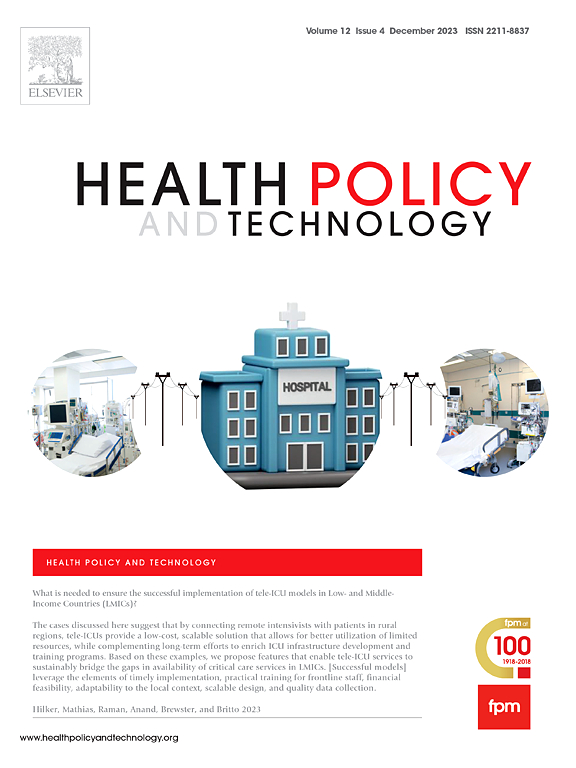年轻人对英国抑郁症的技术个性化青少年心理健康护理的看法
IF 3.7
3区 医学
Q1 HEALTH POLICY & SERVICES
引用次数: 0
摘要
作为英国国家医疗服务体系(NHS)长期计划的一部分,英国将引入青少年心理健康保健的新模式,但人们对如何设计和实施这些抑郁症模式知之甚少。这项研究调查了年轻人对技术支持的个性化青少年抑郁症心理健康护理的关键属性的看法,以确保关键组成部分得到实施。方法分两个阶段收集青少年视角的定性数据。在第1阶段,37名年轻人参加了访谈,在访谈中,他们看到了根据临床阶段区分的两个抑郁症小插曲,并被要求概述护理的关键属性。在第二阶段,8名年轻人参加了一个小组研讨会,共同设计数字护理途径。对记录进行主题分析,以确定关键服务、模型和数字化护理属性。结果主要服务属性强调青年友好、友好的环境,允许及时获得护理。关键的模式属性包括以需求为导向的护理,由青年和家庭参与支持,个性化护理计划,护理协调,监测和同伴支持。数字化护理的关键属性包括便利获得护理、集中评估、患者决策辅助、监测以及灵活性和人力援助的设计原则。结论:研究结果表明,基于个人需求提供护理的循证方法对个性化护理至关重要,该模式的实施需要在青少年心理健康服务中具体配置高度个性化和基于测量的能力。与此相一致,提出了一种为抑郁症提供个性化护理的数字化护理途径。公共利益摘要英国的个性化护理改革将在新兴卫生技术的支持下实施技术支持的、针对青年的护理模式。对年轻人对这些模式的看法的分析表明,技术支持的个性化青少年精神卫生保健的提供可以从服务特征、服务模式和数字化护理途径方面进行定义。年轻人建议,服务应对青年友好,易于获得,而护理应根据个人需要和偏好量身定制。治疗也应该根据需要组织起来,让年轻人有更多的选择。提出了数字化护理途径,以帮助减少护理障碍,并简化从筛查到转诊、评估和服务之间转移的途径。研究结果被用于英国青少年心理健康服务中提供个性化抑郁症护理的数字化护理途径的原型。本文章由计算机程序翻译,如有差异,请以英文原文为准。
Young people’s perspective on technology-enabled personalised youth mental health care for depression in the UK
Objectives
While new models of youth mental health care will be introduced in the United Kingdom (UK) as part of the NHS’s Long Term Plan, little is known about how to design and implement these models for depression. This study investigated young people’s perspective on the key attributes of technology-enabled personalised youth mental health care for depression to ensure the crucial components are implemented.
Methods
Qualitative data of young people’s perspectives was collected over two phases. In phase 1, 37 young people participated in interviews where they were presented with two depression vignettes differentiated by clinical stage and asked to outline the key attributes of care. In phase 2, 8 young people participated in a group workshop co-designing digital care pathways. Recordings were analysed thematically to identify key service, model, and digitised care attributes.
Results
Key service attributes emphasised youth-friendly, welcoming environments allowing for timely access to care. Key model attributes included needs-led care, supported by youth and family engagement, personalised care planning, care coordination, monitoring, and peer support. Key attributes of digitised care included facilitating access to care, centralised assessments, patient decision aid, monitoring, and design principles of flexibility and human assistance.
Conclusions
The results suggest that evidence-informed methods of delivering care based on individual needs is critical to personalised care and that the implementation of this model entails specific configuration of highly personalised and measurement-based capabilities within youth mental health services. In line with this, a digitised care pathway for delivering personalised care for depression is presented.
Public interest summary
Personalised care reforms in the United Kingdom (UK) will see the implementation of technology-enabled, youth specific models of care supported by emerging health technologies. An analysis of young people’s perspective of these models indicated that delivery of technology-enabled personalised youth mental health care can be defined in terms of service characteristics, service model, and digitised care pathways. Young people propose that services should be youth friendly and easy to access, while care should be tailored to individual needs and preferences. Treatments should also be organised on as needed bases with youth having greater choice. Digitised care pathways were proposed to help reduce barriers to care and streamline pathways from screening to referrals, assessments and transfers between services. The results are used to prototype a digitised care pathway for delivering personalised care for depression within youth mental health services in the UK.
求助全文
通过发布文献求助,成功后即可免费获取论文全文。
去求助
来源期刊

Health Policy and Technology
Medicine-Health Policy
CiteScore
9.20
自引率
3.30%
发文量
78
审稿时长
88 days
期刊介绍:
Health Policy and Technology (HPT), is the official journal of the Fellowship of Postgraduate Medicine (FPM), a cross-disciplinary journal, which focuses on past, present and future health policy and the role of technology in clinical and non-clinical national and international health environments.
HPT provides a further excellent way for the FPM to continue to make important national and international contributions to development of policy and practice within medicine and related disciplines. The aim of HPT is to publish relevant, timely and accessible articles and commentaries to support policy-makers, health professionals, health technology providers, patient groups and academia interested in health policy and technology.
Topics covered by HPT will include:
- Health technology, including drug discovery, diagnostics, medicines, devices, therapeutic delivery and eHealth systems
- Cross-national comparisons on health policy using evidence-based approaches
- National studies on health policy to determine the outcomes of technology-driven initiatives
- Cross-border eHealth including health tourism
- The digital divide in mobility, access and affordability of healthcare
- Health technology assessment (HTA) methods and tools for evaluating the effectiveness of clinical and non-clinical health technologies
- Health and eHealth indicators and benchmarks (measure/metrics) for understanding the adoption and diffusion of health technologies
- Health and eHealth models and frameworks to support policy-makers and other stakeholders in decision-making
- Stakeholder engagement with health technologies (clinical and patient/citizen buy-in)
- Regulation and health economics
 求助内容:
求助内容: 应助结果提醒方式:
应助结果提醒方式:


